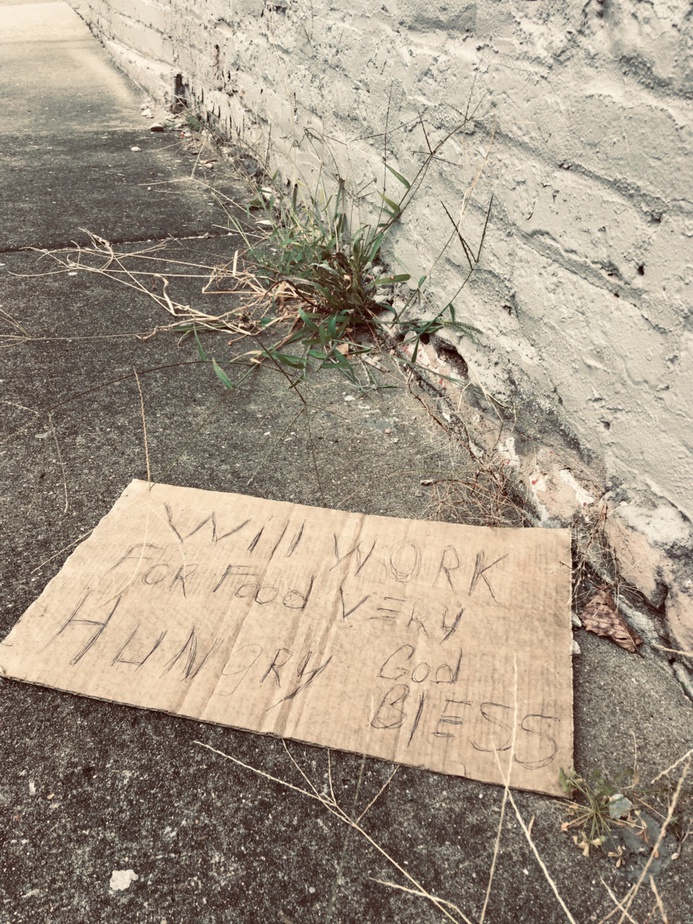(Editor’s Note: Johan Westenburg, who resides in the commercial district of downtown Hopkinsville, wrote the following letter to members of Hopkinsville Council City concerning a pedestrian safety ordinance that would also prohibit some panhandling. The ordinance passed on first reading at the council’s Oct. 15 meeting and will likely come back for final approval the Nov. 5 meeting.)
Honorable Members of the City Council of Hopkinsville,
Every day I am confronted and annoyed by panhandling. I live in the center of Hopkinsville and as I walk to my morning coffee there are at least three unkempt, sad souls begging for money with a mixture of vague hostility and feigned humility. When I drive to the Wal-Mart and Starbucks or the Lowe’s the likelihood of someone standing on the corner with a lunch pail at their side and a sign at the ready is almost a sure thing. We all see it and I think we all would like to find a solution to make panhandling go away in our community.

Passing an ordinance that fines panhandlers is not a viable solution. Worse yet, a monetary penalty meted out to the poor is not only sadly irrational but morally wrong. If a person is so marginalized that they feel okay about standing on the street to beg for money then where do we think these people have the means to pay a fine? If you think these panhandlers are running some sort of a con, don’t you think the conned are just as much a part of the problem as the perpetrator of the con?
Poverty is so frequently considered an outward sign of failure in America and the extreme agitation and embarrassment we feel when forced to acknowledge another’s poverty is probably indicative of the real fear we have of landing on hard times. Americans have the worst savings habits of all the developed countries in the world and it is well known that many of us live from paycheck to paycheck, swimming as fast as we can to make our monthly mortgage and auto payments. When we see someone standing on the street our empathy or ire is raised because we know, “there, but for the grace …”
- Hoptown Chronicle wants to hear what you think: Submit a letter to the editor
If you want to eradicate panhandling in our community, you need to start by having the Hopkinsville Police Department do walkabouts in the downtown; panhandlers and loiterers will disappear if officers are walking — not driving — the streets and confronting individuals engaged in unsafe or provocative behavior. There is no need for citations right away but those citations could be written out for repeat offenders. Penalties for repeated infractions could be community service work.
Another approach to eradicating panhandlers is to erect signs dissuading drivers from giving money at the panhandling hotspots. It is really important to consider that the panhandler is only there because he or she finds it lucrative to be on the corner. If well-meaning people didn’t roll down their window there wouldn’t be a panhandling problem.
Aside from the poor reasoning and uncivil social sensibility that underpins this proposed ordinance there is the very real issue of unconstitutionality. According to attorney Bettina Brownstein “people in their cars may be uncomfortable when panhandlers approach but aren’t truly being threatened and the First Amendment “takes precedence over everything” – even the right of people to feel comfort in their cars.” Brownstein argued the First Amendment defense before the Supreme Court of the state of Arkansas and won.
Like Hopkinsville, the city of Hot Spring, Arkansas faced an increase in the incidence of panhandling. So, in 2016, the city council passed an ordinance imposing “an absolute ban” on solicitation on streets or in medians. The American Civil Liberties Union sued and the city repealed the ordinance according to an article reported by National Public Radio.
Bowed but undaunted, the city passed a new version of the ordinance a year later wherein the safety issue was amplified to avoid the legal difficulties encountered the year before. However, making it illegal for pedestrians or the occupant of a motor vehicle to “interact physically” while the engine was running on a public roadway delivered new constitutional problems for the city of Hot Springs because “physical interactions can convey love, disgust, sympathy, and myriad other emotions.” In striking down the second version of the ordinance, Justice Robert Dawson argued, “All people everywhere routinely communicate non-verbal messages through physical interaction, often without even noticing it” thus banning physical interaction between pedestrians and the occupants of a vehicle has free speech implications.
From every reasonable standpoint, panhandling is annoying and our street corners look poorer for it. That said, from the same reasonable standpoint, financial penalization of marginalized people who have a clear inability to make good choices is just wrong.
I respectfully suggest our local representatives overwhelmingly reject this initiative and enjoin local property owners to desist from offering half-baked, caffeinated, social services to people whose problems are only exacerbated by their reliance on the kindness of strangers.
Johan Westenburg, Hopkinsville


